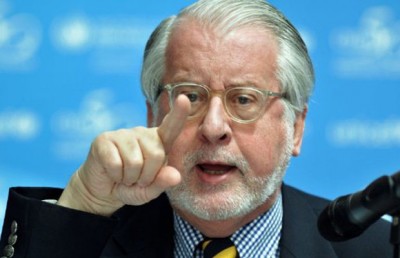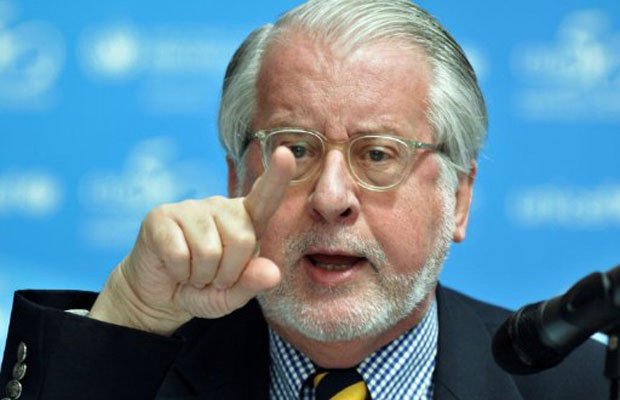 U.N. investigators said Friday they are considering publishing their secret list of alleged war criminals in Syria to press for justice for the thousands of victims.
U.N. investigators said Friday they are considering publishing their secret list of alleged war criminals in Syria to press for justice for the thousands of victims.
In a strong indication that they will do just that, the investigators expressed hope that releasing the names would put alleged perpetrators of torture, executions and kidnappings “on notice,” act as a deterrent and help to protect people at risk of abuse.
“It is unconscionable that Syrians should continue to suffer as they have for the last four years and have to live in a world where only limited attempts have been made to return Syria to peace, and to seek justice for the victims,” said Paulo Sergio Pinheiro, who heads the independent commission charged with investigating alleged human rights violations since the Syrian conflict began in March 2011 .
The four-member commission said in a report to the U.N. General Assembly that there has been an “exponential rise in the perpetration of war crimes, crimes against humanity and human rights violations” in Syria. It said civilians continue to suffer while the many perpetrators are shielded from accountability.
Pinheiro told reporters “we are considering the publication of some names” of alleged perpetrators. He said he expects a decision to be made at the next session of the Geneva-based U.N. Human Rights Council on March 17.
The commission said it has kept the four lists of names it compiled for possible prosecution confidential because its investigations don’t meet the normal requirements of “due process.” But it said “not to publish names at this juncture of the investigation would be to reinforce the impunity that the commission was mandated to combat.”
The four lists were given to the U.N. human rights chief and are in a safe in Geneva. The commission said a fifth list will be delivered to High Commissioner for Human Rights Zeid Raad al-Hussein in March.
In December 2013, Zeid’s predecessor, Navi Pillay, said a growing body of evidence pointed to the involvement of senior Syrian officials, including President Bashar Assad, in crimes against humanity and war crimes. But she was careful to say she hadn’t singled him out as a suspect in Syria’s conflict, in which 220,000 people have been killed according to U.N. estimates and 6.5 million displaced. More than 3 million people have fled the country.
Pinheiro, a Brazilian diplomat and scholar, said last year that commanders of the Islamic State terrorist group were “good candidates” for the list.
He said the list includes people who are “criminally responsible for hostage-taking, torture and executions;” heads of Syrian intelligence branches and detention facilities where detainees are tortured; military commanders who target civilians; airports where bombing attacks are launched; and armed groups and individuals involved in “attacking and forcibly displacing civilians.”
The commission’s new report said “a number of unit commanders and armed group leaders have been listed on the basis of their command responsibility,” including “the so-called ’emirs’ of radical groups.”
To combat extremism, terrorism and human rights violations, the commission said it is essential to bring the perpetrators to justice, tackle root causes and promote social inclusion and peaceful alternatives to violence.
The commission noted last May’s vetoes by Russia and China of a U.N. Security Council resolution that would have referred the conflict in Syria to the International Criminal Court, reiterating that this remains “a key option.” But it said in light of the vetoes, the council should urgently consider establishing an international tribunal to deal with alleged war crimes in Syria, possibly like those for former Yugoslavia, Sierra Leone or Cambodia.
“We are trying to convince, to mobilize the international community to consider … all options on the table for accountability and not to ignore the horrific, the abominable situation of the victims of war,” Pinheiro said Friday.
The report, based on 380 interviews with victims and eyewitnesses during the six-month period ending January 15, details the massive rights violations committed by the government and armed groups. The commission has conducted more than 3,556 interviews since September 2011.
Associated press


Leave a Reply
You must be logged in to post a comment.